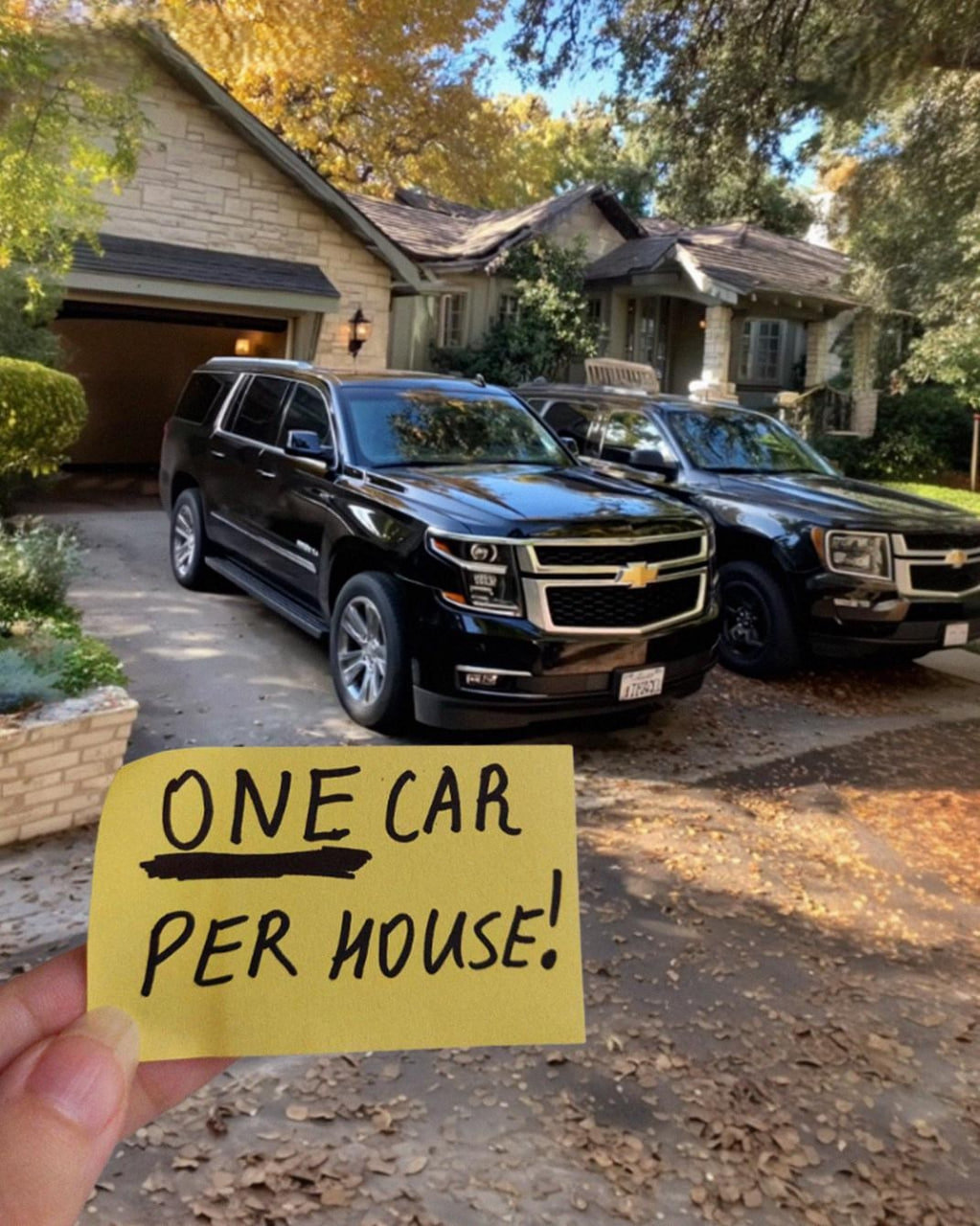The first sign that something was off with our new neighbor came as a piece of paper tucked under our windshield wiper, scrawled in block letters with three aggressive exclamation points: “One car per house! Move the extra one or else!” We laughed when we saw it, thinking it was some grumpy attempt to welcome us to the block.

Our street has no HOA, no strange parking rules, and both of our cars were parked legally in front of our house. It felt like nothing more than someone with too much time on their hands trying to flex a little control. But three days later, the laughter disappeared when we woke to the sound of chains grinding, winches squealing, and the metallic clank of tow trucks working outside. Pulling back the curtain, my stomach dropped—two trucks had our cars already lifted by their front wheels. We rushed out in pajamas and slippers, panicked and confused, and there she was, standing on the curb with her arms folded, smirking like she had just won a battle she’d been planning since we unloaded the moving van. “Well,” she called loudly enough for the drivers to hear, “maybe now you’ll listen when someone tells you the rules.” I couldn’t help it—despite the scene, a laugh escaped me.
Her smug smile faltered. “What’s so funny?” she demanded. “Wow,” I said slowly, “you really went through with it.” She frowned, clearly unsettled by my calm reaction. “Yes,” she snapped. “Because there’s one car per house on this street.” “There isn’t,” I replied, fighting another grin. “And you might want to sit down.” The tow truck operator closest to me, a big guy with arms like steel cables, looked uneasy. I walked over to our car and tapped the small etched plate on the windshield. Both our cars had them—a pair of shiny, official tags that weren’t obvious unless you knew what to look for. “See this?”
I asked. She squinted. “What is that?” “It’s a government permit,” I explained. “These cars are registered under a classic-and-specialty vehicle program. They’re fully legal, insured, and allowed to park here. But here’s the kicker—vehicles with these permits come with very strict towing restrictions.” The tow driver leaned in to look, and when he recognized the code, his whole posture changed. His face went pale and he muttered to the other driver, “Dispatch didn’t tell us about this.” My neighbor’s bravado cracked. “O-okay, but the rule is—” “There is no rule,” I cut in, my voice still steady. “And when someone tries to arrange an illegal tow on protected vehicles like these, the fines don’t land on us. They land on whoever filed the false complaint.”
@theslappablejerk “Also, I heard you walking around at 10 last night. You understand this neighborhood has a curfew?” #cringe #boomer #leadpaintstare #foryou ♬ original sound – Jack Michael Ryan
I nodded toward the operator, who was already scrambling to unhook the chains like they were made of fire. “Tow fees, penalties, administrative fines—the whole thing gets billed to the complainant.” “How much?” she whispered, her face draining of color. I did the math out loud, mostly for the tow guys’ benefit. “Two trucks. Two cars. Permit violations. Weekend rates. Administrative fees. That’s around twenty-five thousand dollars, give or take.” Her mouth opened and closed like she was trying to swallow air. “I—I didn’t know!” she stammered. I kept my tone even, almost kind.
“That’s the point. You didn’t know, you didn’t ask, and you tried to make up rules because you didn’t like what you saw.” By then, the second truck had lowered our car gently back to the asphalt. The drivers avoided eye contact with her, embarrassed and irritated, before climbing back into their cabs. One leaned out long enough to tell us, “We’re sorry. Dispatch didn’t flag it right.” I waved him off. “No harm done. You fixed it.” As the trucks pulled away, our neighbor stood frozen, her pride stripped bare. She opened her mouth like she wanted to argue with reality itself but couldn’t find the words.
“Look,” I said more softly, “we’re new here. We want to be good neighbors. If there’s a problem, come knock on our door. But please—don’t invent rules and threaten people. That doesn’t end well for anyone.” She nodded once, then turned and walked back to her house without saying another word. Since that morning, we haven’t received another note. No more glares, no phantom policies, no staged power plays. When we pass her on the sidewalk now, she studies the sky or the cracks in the pavement with great intensity, pretending not to see us.
The street itself hasn’t changed—two cars parked legally in front of our place, the same sun-faded mailbox, the same oak tree shading the curb. What changed was her attitude, and maybe her understanding that sometimes keeping your cool, knowing your rights, and letting the rules speak for themselves is more powerful than any shouting match. In the end, she learned a hard lesson: consequences have a way of teaching where fake rules never could.





